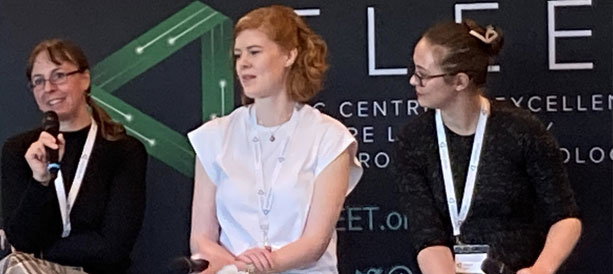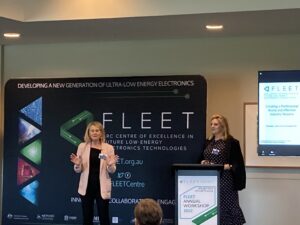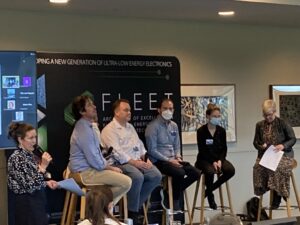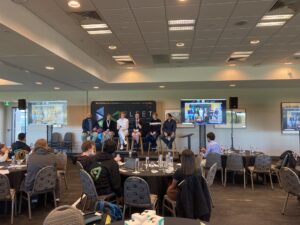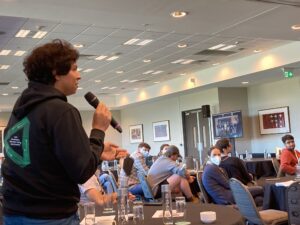FLEET early career researchers and students are taking charge of their professional training and development.
For the 2022 FLEET Annual Workshop this month in Wollongong, the working group delivered a range of research development training sessions and created opportunities for their peers to think about future career prospects.
FLEET2022 ECR development delivered following the Centre’s three-day annual workshop included:
- The ‘kickstart’ program, delivered by veski
- “Academia and beyond” Q&A panel, delivered by the FLEET ECR working group.
- “Does science have to be serious?” journal club, delivered by the FLEET ECR working group.
The program, which included lively panel discussions, workshops and networking sessions, gave over 60 participating ECRs and students an opportunity to develop tools enabling myriad future careers, including the transition from academia to industry.
veski kickstart
The veski kickstart program provided a unique opportunity for ECRs and students to build connections with representatives from the business and professional development sectors, to assist with their career progression.
This kickstart program tailored for FLEET ECRs was focused on pathways and insights from academia to industry. A career planning workshop delivered by career coaches Julie Ferris and Elizabeth Fish prepared ECRs for their future careers, including understanding and positioning their skills, job search strategies with a focus on effective networking, developing resume writing skills, building a personal brand and LinkedIn profile, and pitching to potential employers.
Following this, industry representatives provided insight into their own career paths, how they managed expectations, and assisted ECRs in developing key skills to aid career progression.
Industry representatives included Dr Nadia Court (University of Sydney), Michelle Durant (AINSE), Matt Ford and Paul Goodall (Phillips Ormonde Fitzpatrick), Paul Giusti (IBM Consulting), Dr Jan Gluschke (Commonwealth Bank), Dr Michael Harvey (FLEET and EQUS), Dr Shaira Ismail (PwC), Rebecca Jensen (EY), Pamela Meers (Kiah Consulting ), Dr Marika Kieferova (Google) and Prof Jim Rabeau (CSIRO ).
ECR working group program
The ECR working group program at FLEET2022 kicked off with a “Does science have to be serious?” IgNobel journal club and continued with an “Academia and beyond” panel discussion focusing on science careers within and outside of academia.
The entirety of this section of the workshop was planned, prepared and delivered by working group members.
In the ‘Does science have to be series?’ section chaired by Dr Dan Sando, participants discussed an IgNobel paper and presented back to the group. This activity focussed on building skills in lateral learning, critical thinking, communication and reviewing and analysing scientific data.
The ‘Academia and beyond’ panel addressed the many possible career routes available in science, with a Q&A format. Panellists shared valuable insights and tips on caring for your mental health, networking skills, how to make yourself desirable in the workforce, how to get that first job and the differences and similarities between academia and industry roles.
The panel included FLEET alum and AI Karina Hudson (FLEET/ Sydney Quantum Academy), FLEET PI Kirrily Rule (ANSTO), FLEET alum Carlos Kuhn (12thLevel), Andrew Squires (CSIRO) and Ahmed Halima (Arup), with the discussion facilitated and chaired by working group members Abby Goff and Abhay Gupta respectively.
As part of the program, Q&A style videos were prepared by Abigail Goff, who had sought out ten scientists and interviewed them to share their diverse career paths. These videos, edited by Abigail with Mitchell Conway, are shared on FLEET’s youtube channel, and bring together interviews with Dean Morris (operations manager at the Synchrotron), Virginia Kilbourne (Swinburne’s chief scientist), Desmond Lau (RMIT RMMF/MNRF), Semonti Bhattacharyya (FLEET and Leiden Uni), Marcus Lingham (engineer at Electro Optics Systems), Ken Chiang (RMIT), Liz Bridge (Quantum Brilliance), FLEET alum Jesse Vaitkus (HQS Quantum Simulations) and Richard Winkler (Westpac).
ECR working group
What’s next for the WG? “We plan to run both social events and professional development programs that are fun, enjoyable – ones that don’t feel like a chore. And for that we need more people!” says Abby.
The working group is asking for volunteers from across the Centre, in particular from nodes that are less represented in the current membership.
The ECR Working Group comprises PhD students Abigail Goff (RMIT), Mitchell Conway (Swinburne), Vivasha Govinden, Maedehsadat Mousavi, Dan Sando, and Abhay Gupta (all at UNSW), with the support of FLEET AI Mark Edmonds (Monash).
The Working Group’s activities support:
- Exchange of research ideas
- Enhancing scientific skills
- Expanding members’ professional skills toolkit
- Extending professional and research networks.
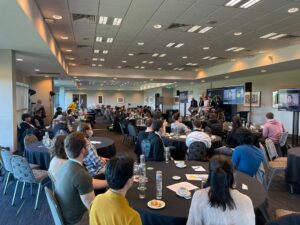 The Working Group delivers quarterly updates to the FLEET Executive Committee on its activities, and support for WG initiatives includes a $10,000 dedicated annual budget.
The Working Group delivers quarterly updates to the FLEET Executive Committee on its activities, and support for WG initiatives includes a $10,000 dedicated annual budget.
Such surveying ensures that training program meets the needs of FLEET students and ECRs. Another survey in early 2022 will specifically track translation and industry-related training needs.
PhD candidate Abigail Goff (RMIT) and Vivasha Govinden (UNSW) are co-leaders of the ECR Working Group.
Since initiation, the Group has:
- Organised an ECR workshop in mid-2019
- Successfully lobbied for a collaborative travel grant scheme implemented in 2019 and a training grant scheme implemented in 2020
- Established a library of resources to build research and professional skills during Covid
- Secured training grants of up to $500 per member from the FLEET Education and Training Committee
- Surveyed Centre students to set training program
- Contribution to veski component of FLEET 2022
- Planning and delivery of second half of ECR conference at FLEET 2022.

